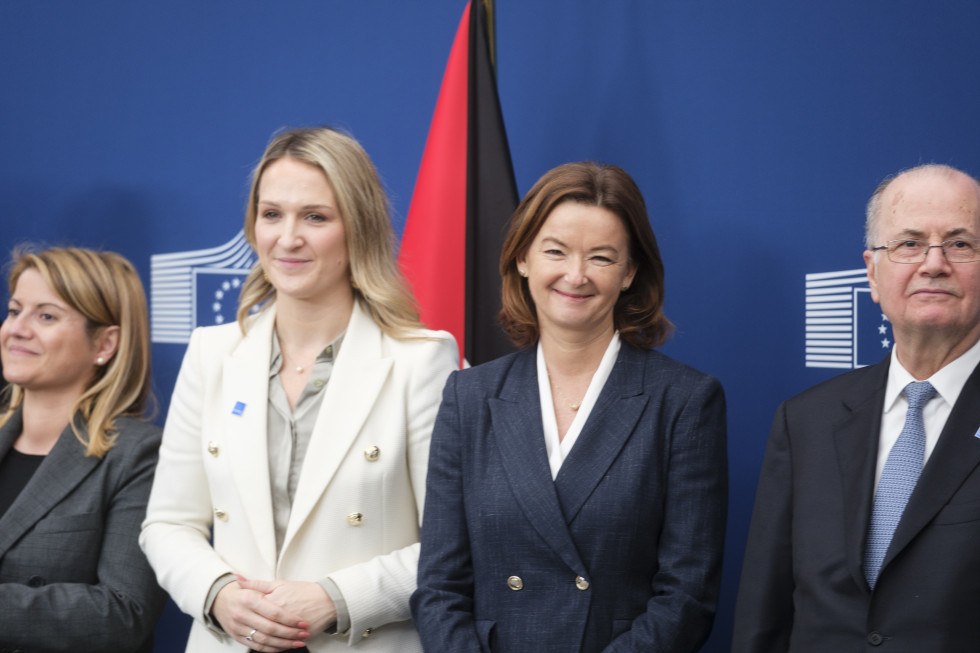Minister Fajon in Brussels to enhance the EU's role in addressing Sudan's humanitarian crisis

Minister Fajon with the new Irish Foreign Minister, Helen McEntee | Author MZEZ/Thierry Monasse
The discussion on Russian aggression in Ukraine focused on the need for continued pressure on Russia, particularly measures against the Russian shadow fleet and comprehensive support for Ukraine, as well as peace efforts and the importance of cooperation with the US in this regard. Minister Fajon stressed that the European Union must increase pressure on Russia for an immediate and unconditional ceasefire and that assistance to Ukraine must continue: "We support efforts to achieve peace that is acceptable to Ukraine and based on international law and the UN Charter. We do not accept any attempt to change internationally recognised borders." She added: "Above all, we must not forget the children who have been killed or who have disappeared in Ukraine. Slovenia supports the organisation of a summit on the safe return of children and a strong text of the resolution within the UN General Assembly. We also intend to join the Special Tribunal for the Crime of Aggression against Ukraine." The Slovenian Foreign Minister then reported on her recent visit to Ukraine, where she visited the locations of Slovenian humanitarian aid and development cooperation projects, including a foster home and a rehabilitation centre for children with special needs.
On the situation in the Middle East, ministers continued their discussion on strengthening the EU's role in the implementation of the current peace plan, with Minister Fajon drawing attention to the ongoing dire humanitarian situation in Gaza and the violence in the West Bank. She called for the delivery of urgent humanitarian aid and for support for the Palestinian Authority. She also explained that Slovenia insists on a two-state solution, as every nation has the right to self-determination. Slovenia supports strengthening the mandates of the EUBAM Rafah and EUPOL COPPS missions and is exploring the possibilities for further cooperation. "I am delighted that, despite the difficulties, we could bring a small group of Palestinian children, victims of the war in Gaza, to our country. Slovenia can show its greatest solidarity in this regard by enabling these children to enjoy at least a short period of normal rehabilitation and peace," she said.
At Slovenia's initiative, ministers discussed the current situation in Sudan, where we are witnessing one of the worst humanitarian disasters in the world. Slovenia supports the EU's enhanced engagement in resolving the war in Sudan, an immediate ceasefire and the resumption of negotiations. It strongly condemns the recent violence and crimes committed by the Rapid Support Forces (RSF) paramilitary group in the vicinity of El Fasher and stresses the need to protect civilians, secure humanitarian access and ensure accountability. Slovenia also supports calls for all involved actors and states to refrain from providing assistance to either side, as this could prolong the violence.
Regarding the Sahel, a region that continues to face security challenges, ministers discussed the EU's renewed approach to the Sahel region, which emphasises the need for ongoing, tailored cooperation. On behalf of Slovenia, Minister Fajon supported the EU's renewed approach, which should contribute to building trust and support dialogue.
At the first ministerial meeting of the Palestine Donor Group, co-chaired by European Commissioner Šuica and Palestinian Prime Minister Mustafa, Minister Fajon stated that, in response to the humanitarian crisis in Gaza, Slovenia has significantly increased its contributions to international organisations, raising them to 5.8 million euros, and has also provided 3 million euros' worth of in-kind aid. Slovenia's humanitarian efforts also include medical care and psychosocial support for victims of armed conflict, including the medical evacuation of 17 patients to Slovenia. "The effective functioning of the Palestinian Authority is essential for Palestinian self-government and a peaceful resolution of the Palestinian question through the establishment of two states. In this context, we emphasise the importance of continuing the reform process of the Palestinian Authority," said Minister Fajon.
On the sidelines of the Palestine Donor Group meeting, the Slovenian Foreign Minister – together with her Irish, German and Spanish counterparts – signed agreements between Slovenia and the Palestinian Authority, and between Slovenia and the EU, on the implementation of projects. These agreements provide for a contribution of 1.2 million euros in support of the Palestinian Authority. With this contribution, Slovenia is supporting the Palestinian Authority, which is on the brink of financial and institutional collapse. In addition to the consequences of the conflict in Gaza and the escalation of violence in the West Bank, budget revenues have fallen significantly as a result of Israeli measures. Effective functioning of the Palestinian Authority is essential for a peaceful resolution of the Palestinian question through the establishment of two states. This is also a fundamental condition for ensuring Palestinian self-government. Slovenia further stresses the importance of continuing the reform process of the Palestinian Authority.
Ministers also met with their counterparts from the ASEAN countries. Minister Fajon commented: "Despite the challenging geopolitical environment for both the EU and ASEAN, we remain reliable partners. We must further strengthen this partnership as we approach the 50th anniversary of cooperation in 2027. Slovenia is willing to intensify cooperation with ASEAN countries, including through accession to the Treaty of Amity and Cooperation in Southeast Asia. "

